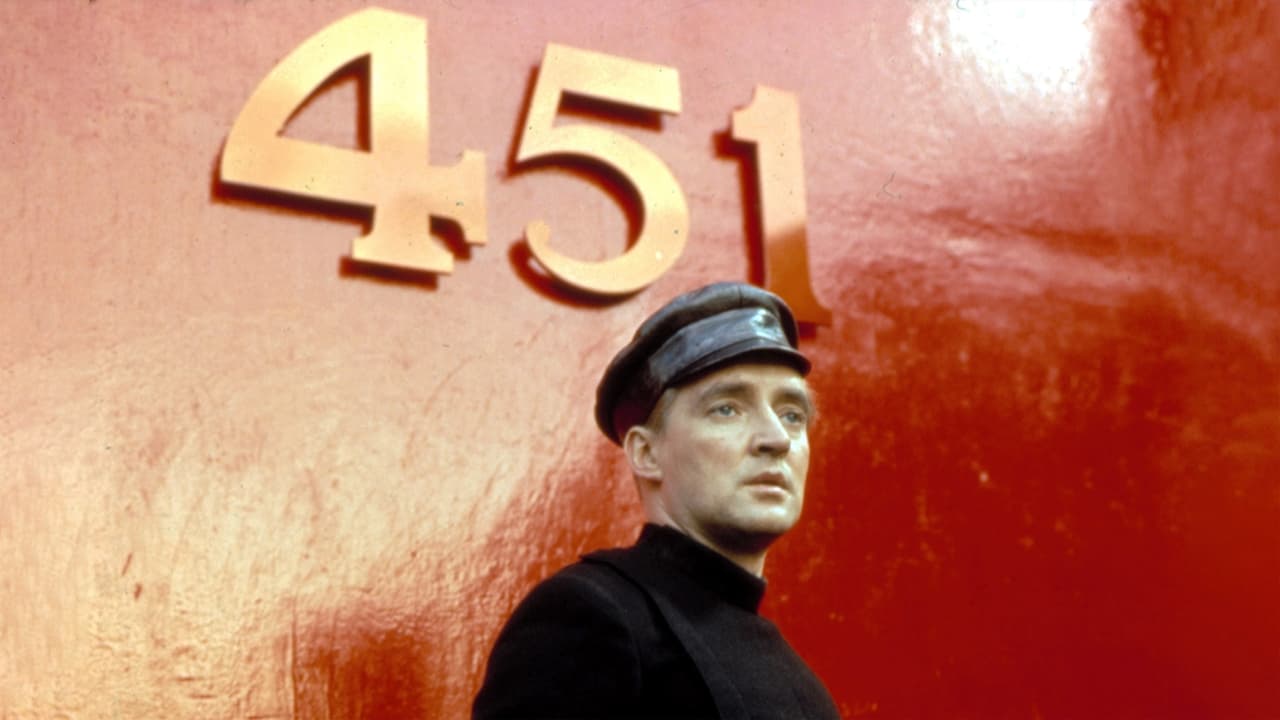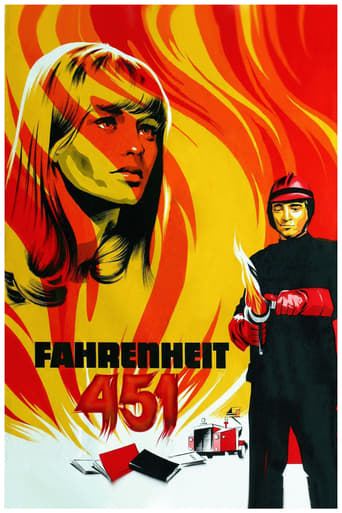

Easily the biggest piece of Right wing non sense propaganda I ever saw.
... View MoreThis is a coming of age storyline that you've seen in one form or another for decades. It takes a truly unique voice to make yet another one worth watching.
... View MoreThis is a gorgeous movie made by a gorgeous spirit.
... View MoreThis is one of the best movies I’ve seen in a very long time. You have to go and see this on the big screen.
... View MoreFantasist Ray Bradbury wrote FAHRENHEIT 451 about new technology rolling in at the time (1953). His theme was originally a critique of the new media, including television--a medium where, too often, then thinking is done for the viewer. Whereas, with books, effort is involved just in hefting it up and opening the cover; and thinking is involved in reading and comprehending.Unfortunately, even by the time the movie came out nearly ten years later and certainly since, pedagogues had taught young readers it was about censorship. The misunderstanding was so serious, once when Bradbury gave a talk at the college and said his book was a media critique, the students protested that HE was wrong.Try watching this movie (if reading a book is too much trouble) with Bradbury's original theme in mind, and think about society half a century later, where books are often considered passe and we're surrounded not only by an exhausting variety of choices on television; where we can read books online or on downloads; and where we are drowning in Internet social media.As for the movie, Julie Christie is always welcome, as is the underutilized Oscar Werner. Personally, I'm no fan of Truffaut and wish someone else directed the thing. However, I like the hopeful ending. The images of book-burning seem geared more to the alternate/censorship application of the story, but that's a failure on the part of the filmmakers to foresee a time when computers would dominate the reading landscape.Compare the book-burning images to the scene in Pal's TIME MACHINE where the time traveler finds the Eloi have plenty of books--but when he picks one up it crumbles to dust because no one has touched it or bothered to preserve what's in it. That brings you closer to Bradbury's vision.
... View MoreA fair adaptation of a quite brilliant novel of the same name by Ray Bradbury (1953). As expected from a movie made in the 60's, there is no CGI or movie effects whatsoever, and for this reason the spirit of a dystopian work was uphold. However, the differences between this and the novel account for my personal preference for the novel: 1/All the scifi elements are dropped, which kinda enhances the idea that human intelligence slows down due to an oppressive society. This is not necessarily a bad thing, it's just I so much prefer the idea that society has developed great technology that enables one person to manipulate it and stands atop of the world. That's just more dystopian to me. 2/The ending scene really bothers me. I can't be the only one who hates it. Specifically the scene where a near-dying man recites Robert Louis Stevenson to his grandchild. To me, it feels as though it's just rote memorization without a precise and spontaneous appreciation and appraisal of the literary work.
... View Moreits virtue - preservation of the spirit of novel. its source of seduction - nuanced use of the images from novel. its role - to remind the essence of dictatorship. short - a beautiful film about censorship who remains an useful example of fine adaptation. a film about the freedom who, with its , at first sigh, simplicity, represents a wise portrait of terror, selfish, hope and its fragility, courage and the importance of truth at the level of individual conscience. a film about beauty. and, maybe, about books. seductive and convincing and useful and charming. because it has the tools to be one of the films who transforms the vision of viewer about reality. as adaptation. but, more important, as a honest film.
... View MoreYet another film, like The Time Machine earlier this month, that makes me want to put down my copy of 1984, which I am also reading. The three of these dystopian futures predicting a world in which there is no written word, or the books themselves are purposely destroyed, makes me want to stay in my blanket fort all day clutching my copies of Harry Potter. In Fahrenheit 451, we meet Guy Montag (Oskar Werner) who works as a fireman; only in the future, firemen exist to start fires to burn books. One can quickly see that Montag is not fulfilled by his work. Even at the news that he will be receiving a promotion, he is not satisfied with himself. One day he meets a woman on the transport, Clarisse (Julie Christie) who seems to be fascinated by the simpleton soldier he seems to be. She sees more in Montag, soon after the audience realizes there is more to see in him as well. He goes about life as a loner, mindlessly carrying along with the other firemen at the station, and even more mindlessly with his wife at home. One can soon tell he is quite conflicted by his work to burn and destroy literature. One morning, a distressed Clarisse urges Montag to go with her to the school she has just been fired from. School is a terrifying place in this film. All the children dress the same and repeat the same learning rhymes no matter the age. Hearing the echoes through the building as Montag and Clarisse pass through the halls is deafening, as the audience realizes that this generation of children will never even know books to have existed. There is no turning back for Montag when one of the calls that his unit responds to is to burn an entire home library. The owner of the home repeats one of the rhymes drilled into the school children's heads before proceeding to set herself on fire among her books, because she would rather burn with them than live without them. It is at this moment that Montag stops feeling so alone, he knows there are people that feel as strongly about books as he does. He must flee to a place where he is accepted, and Clarisse knows just the place. She directs him to a land in which people memorize books and live amongst each other in the peace of their literature and free of the fear that anyone could ever take anything from them, because they themselves become the books.A future without written word looks like a scary place. Montag's home was barren and bleak, with only a telescreen for entertainment. Set design stood out the most for me throughout the film. It was a large task to undertake to make television look dismal, and the art department does a wonderful job of making this a reality. The sterile look of Montag's home made me feel as though I was watching life in a hospital. In a way we are watching life in a hospital, entertainment is mandated, emotions are nonexistent, and it seems as though everyone is just waiting to be done. As Montag remarked, in this world, you're not living, you're just killing time." In addition to the set design, the film was beautifully scored, as legendary Bernard Herrmann lent his talents to this film. Herrmann was also famously behind Citizen Kane, Psycho, and Taxi Driver. Scored beautifully, the audience is entranced by a world so different, and hopefully distant, from our own.The literal theme of burning books is not simply a relic of Nazi Germany. Even today, the fight over school textbooks rages on. We are constantly fighting a battle within our own society on what to permit and what to omit of our own history. This film serves as an adequate warning that we must accept even the darkest parts of our history must be reported and learned from or the all too real possibility of what took place in Fahrenheit 451 could be reality. On a less surface level, one can learn from seeing how much Montag went along sullenly through his life to do something that you find meaningful in life. Rendering your life as a big exercise in killing time will certainly leave you empty, as Montag was before he joined the book people. One must do what makes them come alive and do whatever that is fervently, as to live their own life to its fullest potential. Fahrenheit 451 provided a prudent example of the psychological pitfalls to avoid in life, a reminder we all need as we become submerged in simply going through the motions.As beautiful of a film as Fahrenheit 451 is, I would recommend this film to all students of film. A sensory experience such as this is not to be ignored by those seriously interested in filmmaking. It almost goes without saying that it is a necessity for any fans of Truffaut to see Fahrenheit 451, as well. I've been indebted to François Truffaut ever since the first time I saw Jules et Jim. I was completely blown away by this film and vowed to see as many works from the French auteur as I possibly could. Fahrenheit 451 did not disappoint, if I had the experience to do over, however, I would probably not watch this film at the same time as reading George Orwell's 1984, as I'm now searching the internet for safes for all my books
... View More